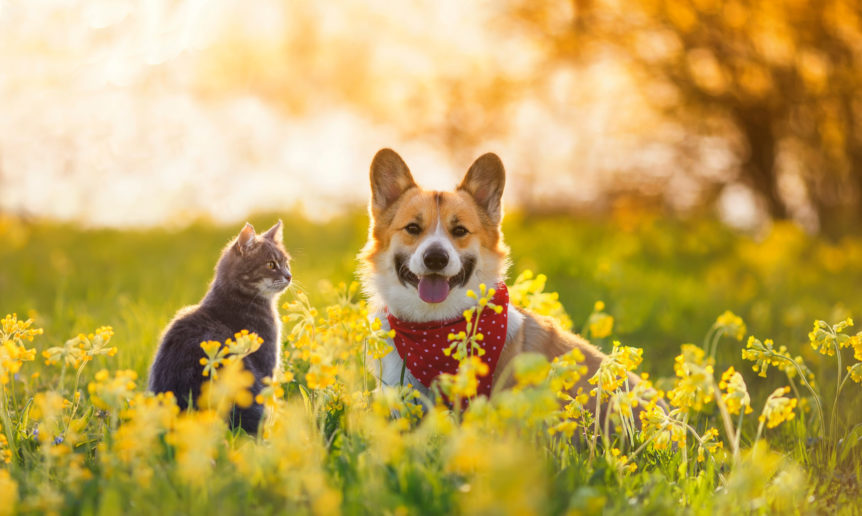

Section

Back
We’re not alone in cherishing our companion animals. In Vedic mythology, dogs are venerated as symbols of the divine and protectors of the gates of heaven. In Nepal, a yearly festival called Tihar is celebrated to give thanks to dogs for their loyal, protective natures. The Hindu folk goddess Sashti, who assists in childbirth, rides a cat, and in the Hindu tradition, killing a cat is a grave sin. Ayurvedic herbs for pet health have been utilized for thousands of years to nurture “man’s best friend.”
Early Ayurvedic texts mention veterinary medicine, treatment therapies, and surgeries — centuries ago, animal healer Sali Hotra wrote the veterinary Ayurvedic Materia Medica as a guide to safe and effective herbs for pets. Below are four adaptogenic Ayurvedic herbs and a formula used for pets. Please note that this information is not intended to diagnose or treat any condition and is for informational purposes only. Consult your veterinarian for any diagnosis and treatment protocol.
*This blog is not intended to replace veterinary advice. Please consult with your veterinarian and use products specially formulated for your dog or cat.*
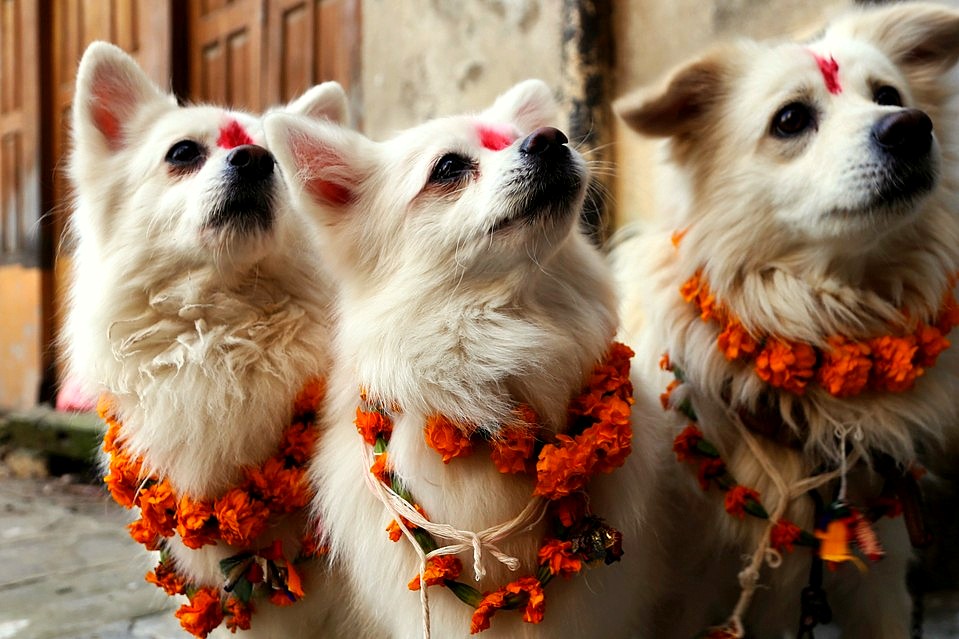
1. Tulsi
Widely venerated in India as a sacred plant, Tulsi provides the same benefits to cats and dogs as it does to humans. It is used in Ayurveda to relieve gastric distress and is an “amphoteric” herb that contains antioxidants and supports immune system efficiency while down-regulating immune system over-activity. Tulsi can also help to calm hyperactive dogs, and support animals who are under environmental or physical stress.
The herb is also recommended for maintaining healthy skin and hair — the ancient Vedic texts recommend Tulsi oil to support a healthy inflammatory response in the skin. Manufacturers of veterinary Tulsi supplements recommend roughly 700 mg. per dose for dogs, and half that for cats. If an animal is prone to low blood pressure, Tulsi may not be recommended as the herb’s calming characteristics may contribute to lowering blood pressure. Tulsi may also slow blood clotting.
2. Ashwagandha
Another Ayurvedic adaptogen, Ashwagandha is available for pets in several commercial formulations. As with humans, Ashwagandha is viewed as a rejuvenator and restorative for pets, and is also used in formulations to help support adrenal health. This herb is notable for its ability to both energize and calm, and also provides a healthy inflammatory response in the body.
Some experts recommend the herb for cats to oxygenate the blood and bolster kidney health, suggesting that Ashwagandha helps regulate oxygen-transporting red blood cells. It is also recommended for calming anxious, frightened animals, helping them to relax and rest. General dosage recommendations range from 200 – 500 mg. twice daily for cats, and 500 – 1000 mg. twice daily for dogs. Please note that this dosage information is for educational purposes only, and not meant to replace your veterinarian’s advice.
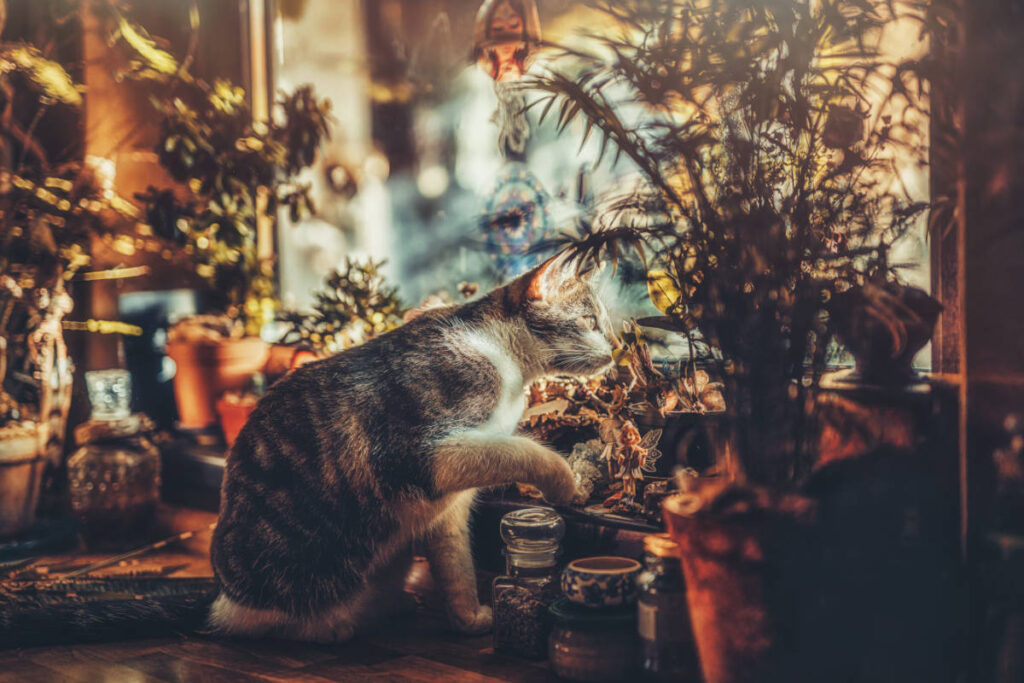
3. Turmeric
When it comes to Ayurvedic herbs for pets, no list is complete without Turmeric. This much-researched herb has gained popularity for its joint-supportive characteristics, but it is safe for pets and has several other beneficial properties. Turmeric is used in Ayurveda to support healthy digestive, respiratory, and circulation systems, and is recognized as having a strong ability to modulate a healthy inflammatory response. It is recommended for animal joint care, for its deep ability to soothe and relieve temporary pain of healthy joints.
The protective herb also supports immune health and maintains vitality and youthfulness in pets. Dose recommendations are one-half to one teaspoon every 12 hours for dogs and one quarter teaspoon every 12 hours for cats. Please note that this dosage information is for educational purposes only, and not meant to replace your veterinarian’s advice.
4. Chamomile
In small doses, chamomile is as calming and comforting for pets as it is for humans. Chamomile’s primary claim to fame is its relaxant properties, and it does indeed have a very soothing effect on pups and cats, alleviating stress and jitters while supporting healthy sleep cycles. A carminative herb, Chamomile blossoms can also soothe the digestive tract, relieve gas and reduce nausea for all around gastrointestinal wellness and ease. Cooled Chamomile tea can even soothe irritated skin on dogs.
Chamomile can be given by mouth in tea, powder, liquid or capsule form. For tea, two teaspoons to two tablespoons depending on the size of your pet is sufficient. Topically, chamomile can be applied as a oil, salve or cream.
! Be sure to use German chamomile German chamomile (Matricaria chamomilla), not English chamomile (Chamaemelum nobile), as English chamomile has been found toxic to cats. Always be sure to get the proper supplement, and in small doses only, for your fur baby and consult with your veterinarian before administering herbs and spices.
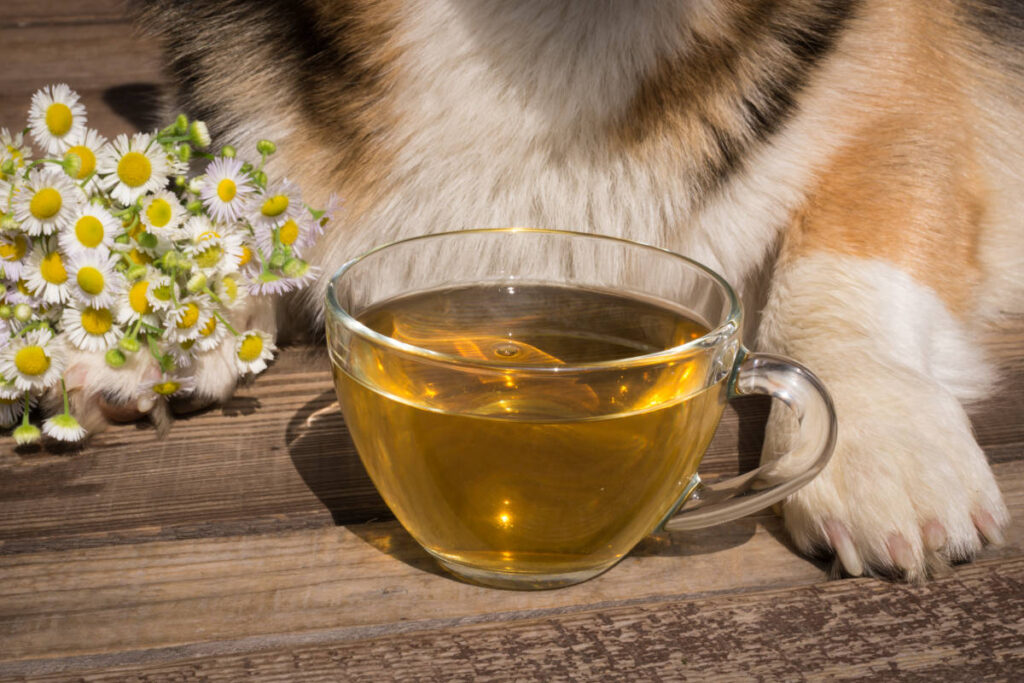
5. Triphala
Triphala is a classic Ayurvedic blend of three wild fruits — Amla, aka Amalaki, Haritaki, and Bibhitaki. This formula has been used for centuries as a tonic to support digestive fire, or “agni,” and provide a gentle laxative action. Triphala capsules contain antioxidants and vitamin C that help support immune health and digestion.
According to Dr. Tejinder Sodhi, Triphala is an intestinal cleanser that, unlike other laxatives, first aids in digestion, then helps the body eliminate toxins. Dr. Sodhi also states that Triphala is a “rasayana,” or substance that rejuvenates the body — he recommends this formula for anyone looking to support the digestive and detoxification organs and systems of the body.
Notably, Triphala is made with “wild-crafted” fruits, meaning that the Amla, Haritaki, and Bibhitaki used in the formulation are harvested from undeveloped forest regions rather than domestically cultivated. ORGANIC INDIA, in partnership with the government of India, has had 800,000 acres of forest certified as organic, so the wild-harvested fruits used in the Triphala formulation are pure and efficacious.
6. Neem
If you want to nourish your kitty or pup’s coat and skin with herbs for pets, look no further than Neem. Neem is a tree that grows throughout Asia, and the bark, leaves and fruit are all used in traditional Indian and Chinese health systems. It has a wide range of uses — from beauty to immunity — that has landed the plant the nickname, “the village dispensary.” This is an excellent plant, whether powdered or liquid, to add to your pet’s beauty regimen.
To start off, Neem is packed with healthy nutrients like omegas and vitamin e, helping to nurture and regenerate the skin and fur while relieving itching and/or wounds. It also is a natural insect repellent, a happy benefit for your outdoor-loving friend. To continue its beautifying benefits, as with humans, the plant is known to be excellent for oral health and you can even find neem bark chew treats in some natural pet retailers.
The plant’s antioxidant content also makes this a choice herb for fighting free radicals and supporting overall immune function to keep your cat or dog happy and healthy for years to come. The plants can be used topically or internally, with many skin-related benefits related to topical use.
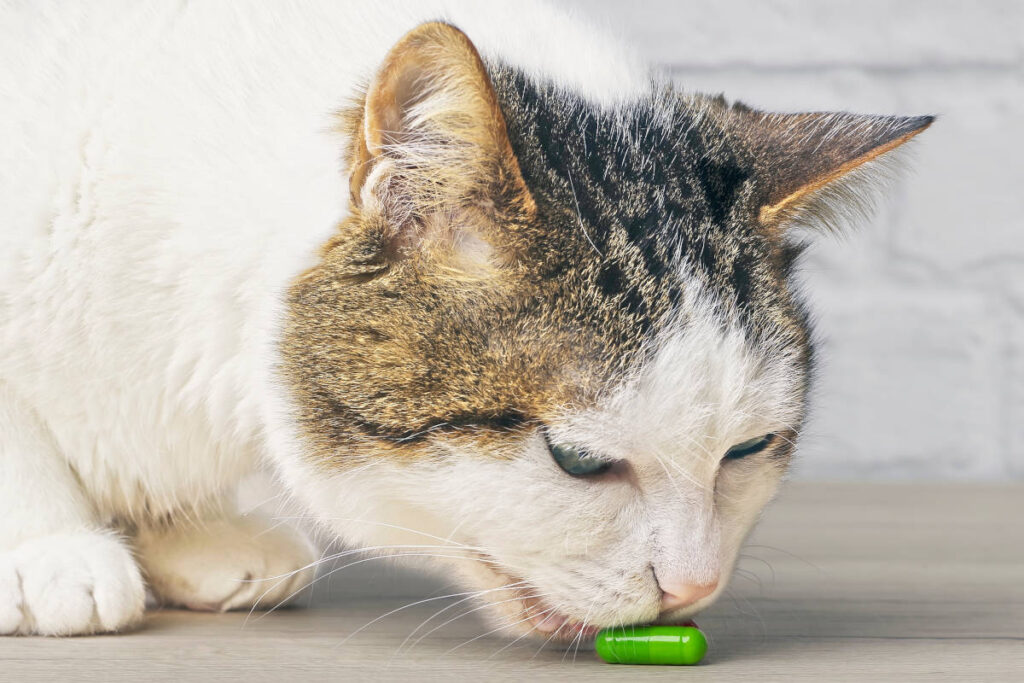
7. Ginger
Fresh, powdered or juiced, ginger is an incredible root for dogs and cats with a wide range of benefits. The plant contains antioxidants that help protect against illness and supports healthy circulation for healthy cardiovascular function. Known to support a healthy inflammatory response, the root can help soothe pet’s joints and muscles, while decreasing gas and bloating for digestive wellness.
Whether minced and sprinkled lightly on food, a thin sliver as a treat, or boiled and cooled for a nurturing tea, dogs and cats love ginger. It must be noted, however, that ginger should only be consumed in small quantities. As wonderful as it is for pets, too much of this intense spice can cause digestive upset. You should check with your vet about exact amounts, but approximately 1/8th to 1/4th teaspoon for small dogs or cats; and 1/2 to 3/4 teaspoon for big dogs is a typically an appropriate amount.
Thanks to modern day teas, supplements, capsules and tinctures, finding suitable herbs for pets is easier than ever. Be sure to double check with your vet before incorporating any tinctures or supplements into your pet’s regular wellness regimen, and utilize products formulated for your fur babies, as dosage likely differs from human.






